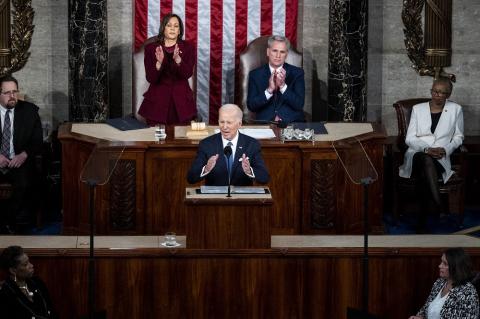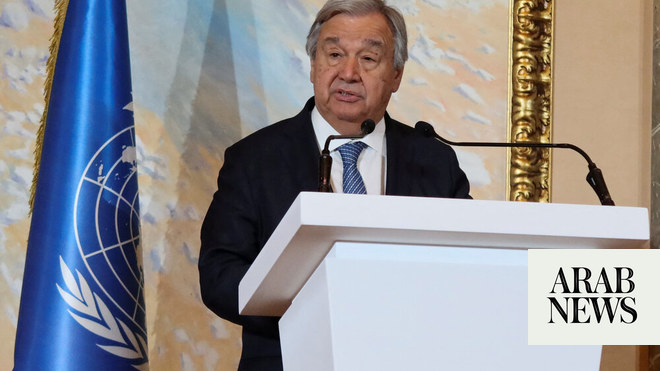
US leader’s message gets mixed response as Washington faces growing rivalry for global dominance
NEW YORK: In what could prove to be his most important moment on the world stage to date, US President Joe Biden stood before the UN General Assembly in New York to declare an end to two decades of war, and a recalibration of US resources toward issues such as climate change, technology and infrastructure development.
In his first address to the UN General Assembly as president, Biden emphasized a list of policy priorities that also included preparations for the next pandemic and greater efforts to combat global warming.
However, the US president faces serious challenges in his bid to convince world leaders that foreign policy under his helm seeks greater global partnerships.
The reception to Biden’s message has been mixed at best, with the speech overshadowed by the chaos of the Afghanistan withdrawal, which drew significant criticism from allies who believe they were not properly consulted.
Biden told the international body: “Our collective future means we must break the cycle of war and destruction. Now we must again come together to affirm the inherent humanity that unites us is more than outward disagreements. We must be prepared for the next pandemic and climate change.”
He declared that the US has “turned a page” and for the first time in 20 years is not at war. Biden declared that there would be no “new cold war” for national resources to be marshaled on and said that the nation is looking at “what’s ahead of us, not what is behind.”
Biden’s message to the world and to America’s competitors comes at a time when serious questions hang over the ability and willingness of his administration to work in tandem with traditional allies and regional partners.
The US leader sought to lay out a new paradigm for America’s place in the world, saying: “We will lead with the power of our example, not just the example of our power. We will defend ourselves, including against terror threats, and we will use force as necessary. The mission must be clear and achievable, and taken under consent of the American people and whenever possible with our allies. Using military power should be the last resort. The America of 2021 is not the country it was in the immediate wake of the 9/11 terror attacks.”
But there have been grumblings over whether the US is prepared to seriously shift focus toward “big power” competition with near-peer competitors.
The administration is facing a particularly turbulent few months of foreign policy challenges that have been viewed with concern by America’s partners across the globe. From Afghanistan to the diplomatic imbroglio with France, and pulling out key US defense systems from the Middle East, Biden’s foreign policy has raised alarm bells in key world capitals.
Complicating efforts to shift focus to a sweeping new vision for foreign affairs, Biden’s approval ratings are the lowest since the start of his presidency, with an average of 46 percent of respondents approving and 50 percent disapproving.
Many allied capitals have privately grumbled that former president Trump and his foreign policy team were, in fact, more keen to consult and coordinate with them behind the scenes compared with Biden. “America First” may have been Trump’s most recognizable campaign and governing slogan, but analysts and diplomats in Europe and elsewhere view Biden as continuing rather than repudiating his predecessor’s foreign policy approach on a number of sensitive multilateral issues.
The lofty ideals of Biden’s “build back better world” blueprint, which he attempted to rally world leaders to to collectively work toward, are likely to ultimately clash with China’s competing vision for global governance.
Prof. Brenda Shaffer, a senior adviser to the Foundation for the Defense of Democracies, told Arab News that “If the US was really interested in limiting China’s actions, it would not have given up a base in Bagram next to Xinjian. In recent decades, every administration comes in and says it is going to focus on major powers and not engage in nation-building, and every administration in the end continues in its nation-building attempts.”
She added: “Washington is likely to focus at the UN on issues of broad international agreement that all support on the rhetorical level — climate change, energy transition, eradicating poverty, justice, etc.”
Biden’s speech emphasized that with the Afghanistan war supposedly behind it, the US must treat climate change and the pandemic as the new national priorities.
According to Shaffer, the administration’s emphasis on climate change diplomacy “puts China in an excellent position. China just needs to agree to some goal to be implemented well down the road, and in exchange for this can get a real strategic concession from Washington.”
And while Biden stressed that the US must continue to support democracy and repudiate authoritarian systems, it is unclear whether the US is ideally positioned to counter a resurgent China that seeks to make its own mark on the international stage, particularly in the developing world.
According to Matthew Kroenig, of Georgetown University, “China presents a comprehensive threat to the rules-based international system, including in international institutions. China has gained influence within institutions with the purpose of undermining these bodies’ founding mission. China vetoes UN Security Council resolutions that are contrary to its interests, prevents the WHO from conducting an adequate investigation into the pandemic’s origins, and blocks the UNHRC from taking action on the genocide in Xinjiang. I would like to see Biden articulate this challenge from Beijing and for him to call on responsible powers to come together to address the threat.”
Biden’s policy ethos has the US sharing a common responsibility with the international community to find new ways to end conflict, and “break the cycle of war and destruction.”
That may be easier said than done. Disrupting such a cycle will require a clear-eyed approach that takes into account domestic considerations as well.
Kroenig said: “The major shift in US strategy toward great power competition and away from terrorism and insurgency happened in the Trump administration, but Biden is continuing this trajectory. Whereas Trump focused heavily on competition and confrontation, Biden is attempting a more balanced approach that includes, first, strengthening the US at home, and, second, seeking engagement with China on common challenges, like climate change.”
Biden urged the international community to “get to work” on the common tasks ahead to make a better world for all. Competition with China is increasingly likely to heat up on a number of fronts, regardless of the US leader’s intent to seek dialogue rather than confrontation. Biden said that the US and the international community now stand at an “inflection point” and must decide how the world can “come together to affirm the inherent humanity that unites us.”
Looking beyond the nobility of such a goal, many of America’s traditional allies will still wonder whether Biden’s administration will live up to the grand ideals and sweeping calls for improving lives across the world, or whether his speech will become a footnote in a line of foreign policy blunders.












